- Home
- Brian Falkner
Clash of Empires Page 8
Clash of Empires Read online
Page 8
“We are refining the weapons every day,” Congreve says with a glance at Frost more dangerous than any of his rockets. “They grow more accurate and more reliable. In fact, we are already working on a design that would spin the rocket, like the rifling on a carbine, providing stability in flight.”
“Then perhaps you should have waited until that design was ready for demonstration,” the duke says. “In the meantime I am afraid our best hopes are still the mesmerization techniques and the pepper.”
“Sparkle sticks against dinosaurs,” Congreve scoffs.
“We still have time to perfect the rockets,” Wood says. “Napoléon will not dare to invade anytime soon. The Royal Navy still controls the Channel. He will lose his ships and his precious battlesaurs, should he risk them in a Channel crossing.”
There are murmurs of agreement, but Frost coughs loudly and in the quiet that follows says, “Napoléon is a cunning tactician.”
“A fact we are all aware of,” the duke says. “What is your point?”
“The man knows he cannot sneak past or defeat the Royal Navy, yet he still plans an invasion. Why?” Frost asks.
“He is delusional,” the earl says.
“Let Frost speak,” the duke says. “I want to hear his thoughts.”
“Napoléon is a master of deception,” Frost says. “The army at Calais could be a decoy.”
“He still must cross the Channel somewhere,” the earl says. “And the Royal Navy will not allow that.”
“There is talk of a French fleet at Brest,” Frost says.
“The fleet at Brest is nothing but a fancy,” the earl says. “This is your decoy. Our spies tell us that the so-called fleet consists of nothing but freighters and barges, painted to look like warships. Their cannon are made of wood. Napoléon seeks to deceive us, to divert our ships to the south so he can cross at the narrow of the Channel. We will not be so easily fooled.”
“A cargo ship can still carry a dinosaur,” Frost says.
“Napoléon is at Calais,” the duke says. “I know the man. He rides at the head of his army. If the attack was to come from Brest he would be there and so would his battlesaurs. Yet none have been spotted. They have, however, been parading around in open sight at Calais.”
“All the more reason to think that it is merely a decoy,” Frost says.
“Even if you were right,” the earl says, “it would not matter. A powerful squadron blockades the port at Brest. That fleet, real or no, will never leave the harbor.”
“It seems unlikely that Napoléon could make good his threat to invade the British Isles,” the duke says. “But Frost is right. He makes his preparations. And so we must make our own preparations in case he should make land.”
“My rocketeers will be ready,” Congreve says pompously.
The duke does not quite manage to conceal a look of mild frustration.
“The trojansaurs destroyed today were modeled on those we encountered at Waterloo,” Frost says.
“Of course. We had reliable witnesses to their size and ferocity,” Wood says. “You and your man Sullivan foremost among them.”
“It might interest Your Grace to know that those battlesaurs are not the largest in Napoléon’s army,” Frost says.
There is a shocked silence around the table.
“You jest, sir,” Frazer says.
“I saw these creatures with my own eyes,” the duke says, “albeit from a greater distance than you. You say there are larger ones?”
“I do, sir,” Frost says. “A young man named Willem Verheyen, of Gaillemarde, near Waterloo, killed a much bigger animal prior to the battle when it escaped from Napoléon’s men and attacked his village.”
“Ah, yes,” Congreve chuckles. “Willem, the Wizard of Gaillemarde.”
“The saurs at Waterloo were taller than an elephant,” the duke says doubtfully.
“And yet dwarfed by others in Napoléon’s army,” Frost says.
“Rumor and exaggeration.” Congreve snorts. “I would question this Willem Verheyen myself, if he even exists.”
Frost smiles. “He most certainly exists.”
“Then bring the boy here,” Congreve says. “Let us hear from his own mouth about this mythical beast of Gaillemarde.”
“Indeed he is already here,” the duke says with a smile at Willem.
Willem leans forward so they can see him.
There is complete silence at the table.
“Major Lux?” Congreve asks, clearly shocked.
“A necessary subterfuge,” the duke says, “and one that I trust you will all treat with the greatest confidence.”
“Willem, do you honestly expect us to believe that the saur at your village was larger than the ones we encountered at Waterloo?” Frazer asks.
“Much larger, I think,” Willem says. “Although I did not see those at Waterloo.”
“Piffle,” Congreve says, and laughs. “What he saw grows larger in his mind’s eye than ever it was in reality.”
“The beast was tall enough to take a man from our watchtower in the church steeple while standing at its base,” Willem says.
“The churches must be small in Gaillemarde,” Congreve scoffs, but as Willem looks at the faces that surround him, he sees only horror.
“Yet you killed this giant?” Frazer asks.
“With help from a friend,” Willem says.
“Using no more than mesmerization and a bolt from a crossbow,” Frost says. “Had Willem’s village been armed with Sir Congreve’s rockets I fear Willem would not be sharing luncheon with us today.”
“We must find some answer to Napoléon’s great beasts, and soon,” the duke says. “Before the tyrant finds a way to outwit the Channel Fleet.”
“What about the Ottomans?” Wood asks. “Can we rely on them to join a new coalition against the French?”
All eyes turn to the earl.
“We cannot expect any help from that quarter,” the earl says.
“What was the response from Sultan Mahmud?” Frazer asks.
“The Ottoman Empire will not be joining any coalition,” the earl says. “The sultan does not want to antagonize Napoléon.”
“He joined us and the Prussians in the Second Coalition, why not this one?” Wood asks.
“He does not want to fight on the losing side,” Frazer says. “He dreams that having conquered Europe, Napoléon will leave the Near East alone.”
“He should learn from history,” the duke says. “The Mongol hordes once controlled Europe from west to east. I am sure Napoléon has even higher ambitions.”
“I also suspect that Mahmud conducts his own expeditions to the Amerigo Islands,” the earl says. “In search of his own dinosaurs.”
“That will do him no good,” Frost says. “He does not know how to train or control the saurs.”
“Nor how to fight them,” Frazer says. “Which we do, thanks to Willem.”
“Indeed,” the duke says with a warm smile at the young man. “Thank you for your efforts to date, Willem.”
“It has been my pleasure to serve,” Willem says formally. “I…” He falters, unsure how to continue.
“Speak your mind,” the duke says. “I presume you are about to remind me of my side of the bargain.”
“That was my intention, Your Grace,” Willem says uncomfortably.
“You are eager to rescue your mother and a young woman, whom the French have imprisoned at an abbey in the Sonian Forest near your village. Our agreement was two hundred light cavalry, if I remember correctly,” the duke says.
Willem thinks the duke remembers perfectly well, but says only, “Yes, Your Grace.”
“A well-conceived plan,” the duke says. “Such a force would be very mobile. How long do you think it would take you to reach the abbey after you make landfall?”
“A matter of hours, your grace,” Willem says. “Certainly before any sizable force could be mobilized against us.”
“And if they unleash their dino
saurs?” Wood asks.
“It is a good question,” the duke says. “Horses are no use against battlesaurs. We saw this at Waterloo. No matter how well trained, they will throw their riders and flee in terror.”
“Napoléon’s dinosaurs have already joined units in Calais or Brussels,” Frost says. “There will be few, if any, left at the abbey.”
“And the battle will be a short one, Your Grace,” Willem says. “There are secret underground ways into the abbey. While the cavalry attack from the front, a small force, including myself, will emerge inside the abbey, rescue the prisoners, and retreat the same way. Even if there are still battlesaurs at the abbey, our entire force can withdraw, the battle over, before a single beast sees the light of day.”
The duke sighs and steeples his fingers. He looks at Willem across the top of them. “Young man, you know that Bonaparte sits just across the Channel, teetering on the edge of invasion.”
“Of course, Your Grace,” Willem says, desperately afraid of what the duke will say next.
“Two hundred horses, in the right place at the right time, might be the difference between throwing Napoléon back into the sea or England becoming the newest state of the French Empire,” the duke says.
“Your Grace, you made a promise—” Frost begins, but the duke stops him with a raised hand.
“An Englishman takes his honor and his promises very seriously,” the duke says. “And you shall have your two hundred cavalry. But not just yet. Let us deal with this threat of invasion, and as soon as our isles are secure once again, I will give you whatever you need to rescue your mother and this girl.”
“That may be too late,” Willem protests.
“It has been three months,” the duke says. “What is another three weeks, or another three months, if it comes to it?”
Willem stares at the table for a moment and there is silence. He slowly raises his eyes to meet the duke’s.
“For many weeks I did not know where my mother was held,” Willem says. “Or Cosette, the girl who has my heart. When I found out, I wanted to rush there immediately, but I stayed to complete the training of your men, as per my promise. Now I need you to uphold yours, so that I can free them before they are moved or killed. Who knows what indignities they are being subjected to by Napoléon’s men? You cannot default on your agreement.”
“Such insolence,” the earl says.
“He is young and passionate, not insolent,” the duke says. “And he is right, I made a promise. Willem, you will have your men, but not until I can release them. I am sorry, but that decision is final.”
He drains the last of his glass and refuses with a flat hand when offered more.
“It has been a truly interesting day,” he says, and stands. “In many ways. But now, unfortunately, I must return to Whitehall. Congreve, I look forward to a future demonstration of your spinning rockets.”
“Of course, my lord,” Congreve says.
The duke turns to the earl. “Lord Wenzel-Halls, will you ride with me back to London?”
“Thank you, Your Grace,” the earl says. “But I have another matter to attend to. I will find my own way back.”
“As you wish,” the duke says with a short bow.
IN PRIVATE
“Lieutenant Frost, I am given to understand that you requested a private audience with me,” the earl says. He pushes his plate away from him with an expression of contentment.
“That is true, my lord,” Frost says, including Willem with a nod. “For both of us.”
“The two saur-slayers,” the earl says. “Is it anything that cannot be said in front of your fellow officers?”
“It is a private matter concerning your son,” Frost says.
The earl’s expression grows cold. “Come with me,” he says. “We will adjourn to the smoking lounge.”
The earl’s aide, a hard-faced man, is the first to stand.
“A private matter,” Frost emphasizes.
“There is nothing that Arbuckle’s ears cannot hear,” the earl says.
As they walk, Willem says quietly to Frost, “I did not get the chance to ask the duke about Héloïse.”
“For the best, I think,” Frost says. “However, the earl also is a man of great influence. We will ask him.”
The smoking lounge is a plush room that reeks of cigars. Arbuckle closes the door and stands in front of it. He is more than an aide, Willem thinks. He is a protector, a guardian. Arbuckle is a dangerous-looking man. One of his sleeves rides up a little as he folds his arms across his chest, and he smooths it back down, but not before Willem has seen the hilt of a weapon, probably a small dagger, strapped to his wrist.
The earl settles himself into an armchair and produces a box of snuff. He takes a pinch and discards it before speaking, dabbing at his nose with a handkerchief.
“My son,” he says. “I was blessed with only one. Therefore you speak of Dylan.”
“We do, my lord,” Frost says.
The earl lifts his head, as if raising himself above such conversation.
“Lost at Waterloo,” he says. “His body was not found, therefore I still hold hope for his return. Unless of course he was eaten by one of Napoléon’s monsters.”
“Your son survived the battle,” Frost says.
“He was not eaten,” Willem adds.
The earl sits forward suddenly in his armchair. “You know this for a fact?”
“The British Army set up a field hospital in my village,” Willem says. “It was there I met Lieutenant Frost. Your son was there, also.”
“So you saw him, Lieutenant?” the earl asks.
“My eyes were lost before I arrived at the hospital,” Frost says. “I did not see him, but I spoke to him.”
“Then what became of him?” the earl asks. “Is he held prisoner by the French? There has been no ransom demand.”
“He aided us in our flight from the village,” Willem says. “But he had been wounded and was near death, even then.”
There is a silence.
“You are sure this was the earl’s son?” Arbuckle asks. His voice rasps like rough stones.
“I am an officer and a gentleman,” Frost says. “You have no need to doubt my word.”
“You were blinded,” Arbuckle says. “And dependent on the word of the man you met. And I mean no disrespect, but you are still a child.”
“As was Dylan when he was wounded in battle,” Willem says. “And as he was also when he helped us escape, at risk of his own life.”
“If it was my son,” the earl says.
“He gave me this,” Willem says, taking a leather cord from around his neck. On it is a ring, with a crown below a lion. “He asked me to return it to you.”
The earl, who has opened his mouth to speak, now closes it. He reaches out and takes the ring, turning it over and over in his hands. His shoulders crumple and the whole man seems to deflate. Eventually he slips the ring onto one of his fingers.
“You really believe him to be dead?” he asks softly. “I have long suspected, but still, in my vanity, have held on to the idea that he hides somewhere in Europe, banded together with other survivors, or perhaps taken in by the Prussians.”
“The amputation was a high one,” Willem says.
He does not have to explain what that means. Dylan had little chance of survival.
“There was little life left in his body when we bade him farewell,” Frost says. “I feel he used his last breaths to buy us time to escape.”
“Which would explain why there has been no contact, no ransom demand,” the earl says. He bows his head, all trace of arrogance now gone. A father grieving over a lost son. No longer a nobleman, just a man, suddenly old.
“Your son was a hero, my lord,” Frost says. “Without him, we would not be here, and our army would not have the benefit of Willem’s knowledge. Thanks to your son, we have a chance against the battlesaurs.”
The earl nods. “He was a strong boy, in character and in body. He w
ould one day have made a fine earl.”
“I am sorry for your loss,” Frost says.
Willem echoes the words but they seem trite and meaningless in the face of the earl’s misery.
“I thank you for the return of this ring,” the earl says. “And for your information about my son. If there is ever anything I can do, a favor to return, you need only ask.”
“The rescue mission to the abbey in the Sonian Forest,” Frost says.
“That will have to wait,” the earl says. “The duke has made his decision.”
Willem draws a deep breath. “I do not want to go to the Sonian,” he says. “I am frightened of the place. I am frightened of what I might find there, of what I might have to face. I am secretly pleased that the duke has said no.”
“Then we are agreed,” the earl says.
“All I have lived for these past few months is the warmth of Cosette’s smile and the sound of my mother’s voice,” Willem says. “Each morning I wake thinking of the day when I will see them safe from Napoléon’s grasp. This is my only desire. I will go to the Sonian, despite what I may find there.”
“You offered a favor,” Frost says.
“I will speak to the duke,” the earl says. “That is all I can do.”
“Speak firmly,” Frost says.
“There is something else,” Willem says. “There is a girl in the lunatic asylum of St. Mary of Bethlem.”
“Bedlam,” the earl says with a sigh.
“She is a friend,” Willem says. “She saved my life.”
“And mine,” Frost says.
“This untamed creature saved your lives?” The earl looks incredulous.
“In our escape from Gaillemarde she showed us secret ways through the forest,” Frost says.
“And in Antwerp she outwitted a traitor,” Willem says. “We would not be here except for her.”
“Remarkable,” the earl says. “But if she is in Bedlam, it is for a reason.”
Willem shakes his head. “She is unwell, but not in the way they think. She is not mad. She is just … different. Someone beyond their experience or their ability to ‘cure.’”
“Different. Beyond their experience.” The earl repeats the words, not as a question, just sounding them out with his own voice.

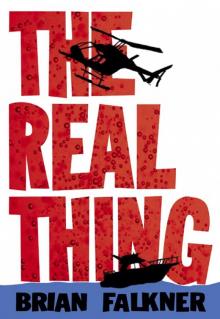 The Real Thing
The Real Thing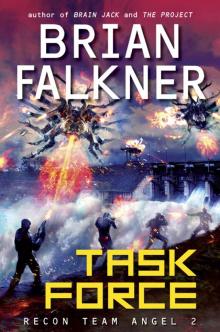 Task Force
Task Force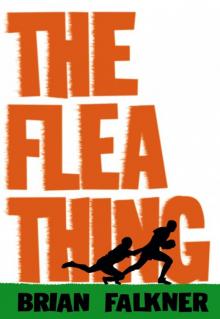 The Flea Thing
The Flea Thing The Project
The Project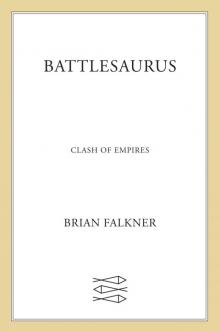 Clash of Empires
Clash of Empires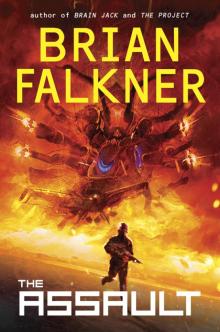 The Assault
The Assault Brain Jack
Brain Jack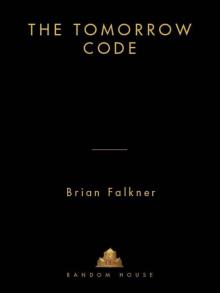 The Tomorrow Code
The Tomorrow Code Vengeance
Vengeance The Super Freak
The Super Freak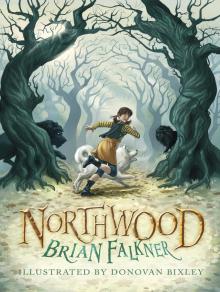 Northwood
Northwood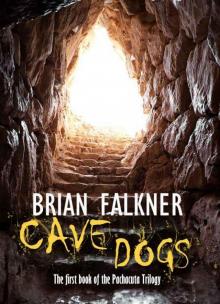 Cave Dogs (Pachacuta Book 1)
Cave Dogs (Pachacuta Book 1)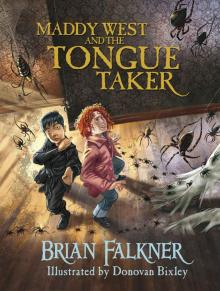 Maddy West and the Tongue Taker
Maddy West and the Tongue Taker